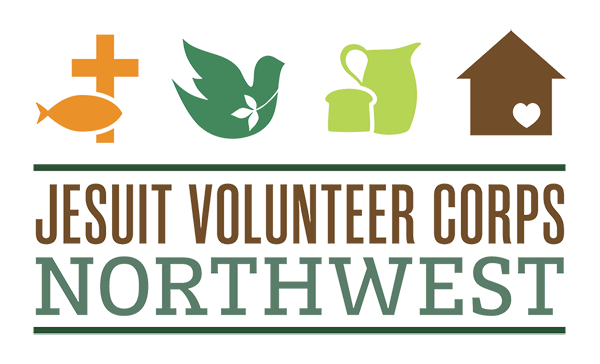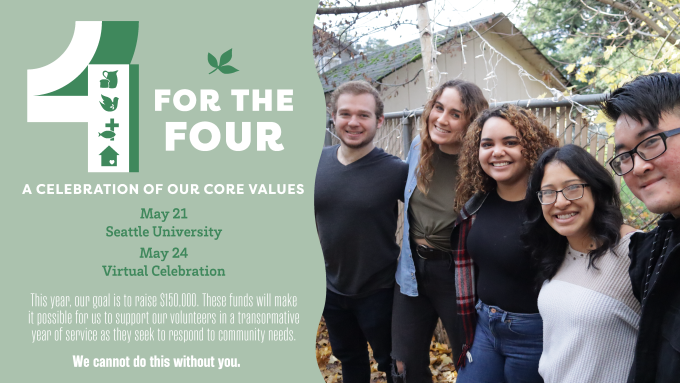World AIDS Day
JV AmeriCorps member Emily Breakell (‘17-18 Portland, OR) serves as the Activities and Events Coordinator for the Ecumenical Ministries of Oregon’s HIV Services. To commemorate World AIDS Day, Emily shares a reflection on her experience serving in the HIV Day Center in Portland, OR.
“Silence=Death?” the coffee barista asked, questioning the text on my shirt. I had almost forgotten that I was wearing such a striking tee—black, with a pink triangle, and the text “SILENCE=DEATH.” I struggled to come up with a quick but adequate response.
“This logo was created in the late 80’s by ACT UP (AIDS Coalition to Unleash Power) activists. It represented the need to resist the taboos that made the AIDS crisis possible.”

The kind barista replied, “Oh!” as I handed him too much of my monthly stipend in exchange for sweet, sweet caffeine. “But, why wear it now? It’s not the 80’s.”
I replied simply, “Are you sure?” And pointed vaguely towards a speaker as Madonna was playing in the coffee shop. But here’s what I should have said:
Globally, more than 35 million people have died of HIV or AIDS, making it “one of the most destructive pandemics in history.” An estimated 36.7 million people are currently living with the virus. I am a JV AmeriCorps member at an HIV Day Center where I spend time with people who are HIV-positive, and they are fighting through silence and stigma each day. While medical treatment, prevention education, acceptance of the LGBTQ+ community, and HIV/AIDS services have improved since the 80’s, we have a lot of work left to do to create an HIV/AIDS-free world.

The SILENCE=DEATH logo is a reminder that when we don’t talk about HIV/AIDS as something that is presently detrimental to the lives of people in our communities and around the world, we are failing to live in solidarity with our neighbors. Sometimes, the word solidarity comes off as disingenuous or as a “buzz word.” Instead, solidarity is an invitation to lean into what seems most heartbreaking or difficult to face. It is easy to dismiss social problems as being too large to face. It is easy to forget about people outside of our circles or to judge them as having made poor or immoral life choices. It is hard to dig deep into the complexity, to unearth the truth that we are all fiercely resilient people with a capacity for joy amidst pain and that caring for people with HIV/AIDS means caring for humanity.
It is difficult not to notice this wisdom welling up in regular interactions at the Day Center. While we provide services like hot meals, showers, laundry, clothes, and wifi, perhaps the most important reason the Day Center exists is to be a space for building community and relationships. I have seen people be literal mutual shoulders to cry on; I have witnessed able-bodied clients carry their friends’ walkers up and down our basement stairs daily; and I have heard heart-wrenching stories over eggs and toast all too regularly. The Day Center staff works incredibly hard to create a space where people feel safe, and where they can find people who understand some of what they are facing each day.

Some clients have very few people in their lives with whom they can candidly talk about their experience being HIV+. Because of stigma, many people try to hide their HIV status from family and friends, and the Day Center might be the only place where they are able to talk about certain realities. As the Activities and Events Coordinator I am lucky to be able to facilitate some of the community-building at the Day Center through leading amateur group yoga, (mostly un)guided painting, driving a 12-passenger van through Portland traffic to go on field trips, and so much more. It is in these spaces, where I am coloring alongside a client or walking into the Sauvie Island Pumpkin Patch with 12 clients, that I get to hear life stories and experiences that tear down every harmful stereotype one might try to draw up about Day Center clients. That seems to be the solidarity I am learning as a JV AmeriCorps member. That it isn’t all about the service I am doing for HIV+ people. It is the slow process of us learning each other’s humanity and realizing that our joy is tied up in each other’s.
That might sound pretty lofty and spiritual. But in earnest, my experience of this community has been one of laughter and silliness and joy. This community consists of people who carry rich life experiences and stories of love, hope, and loss. This community cares for each other through cups of coffee, snarky jokes, games of pool, and listening ears.
This World AIDS Day, I will be munching on eggs and toast with my friends at the Day Center and grounding myself in gratitude for the joy they bring to my life. I invite you to do better than I did at the coffee shop—break the silence around HIV/AIDS in your own way, and to lean into discomfort and your own version of solidarity.
More statistics and information available at: https://www.worldaidsday.org/about

